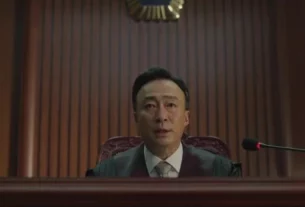“Squid Game”, “Sweet Home”, “Kingdom”… After entering South Korea, Netflix will invest in producing one or two high-quality hit shows every year.
Through them, we can also sum up the “traffic password”: thriller, curiosity, heavy mouth, torture and so on.
“Hellbound” is another high-energy new drama based on this.
During the initial publicity, the show was full of gimmicks.
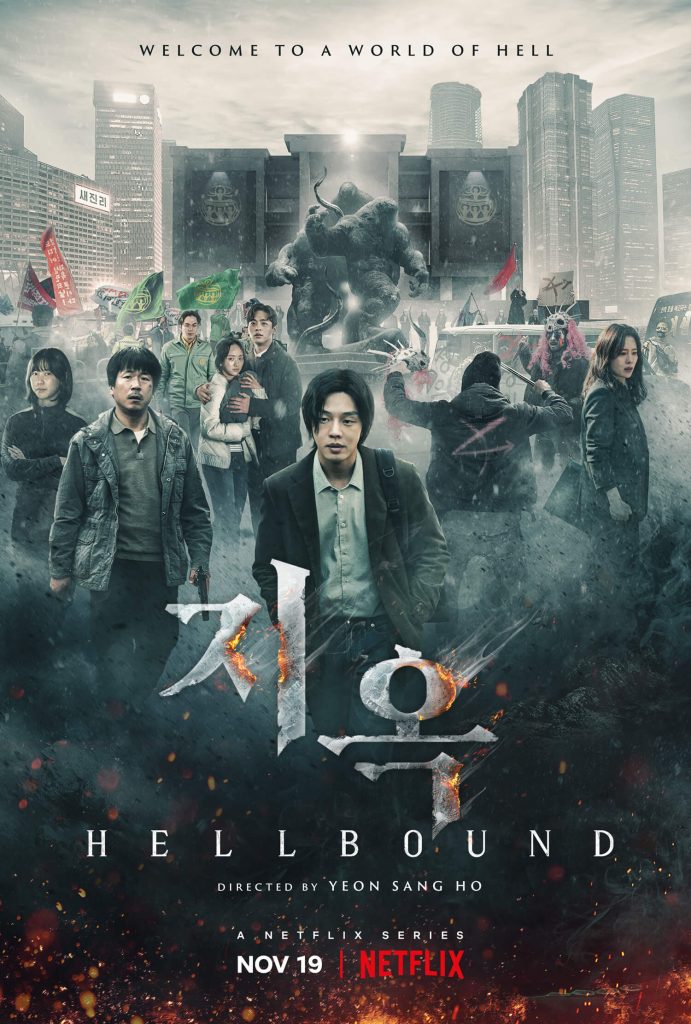
The director of “Train to Busan” Sang-ho Yeon + “Fourth Award Winner” Yoo Ah‑in, the series is adapted from a Korean webcomic of the same name. It is hailed as “the most impactful work in history.”
This is not the first time Sang-ho Yeon has become involved with the manga “Hellbound”.
He used this as a source of inspiration to create an animated short film “지옥: 두개의 삶”.
“지옥: 두개의 삶” tells the story of one day when an angel suddenly appeared in front of the male protagonist and predicted his imminent death.
This can be regarded as the prequel story of “Hellbound”.
Related Post: “Hellbound” got an IGN score of 9: A highly exciting drama!
The drama version “Hellbound” continues the high concept setting of predicting death. The messenger of hell comes to the world to punish those who are declared dead by the “god”.
This phenomenon caused panic in the whole society, and at the same time a cult group took advantage of the rise.
But after watching this show, you will find that supernatural phenomena are just its introduction.

What “Hellbound” really wants to discuss is the blind obedience and brutality of the people under the circumstances of anarchism and lack of social credibility.
The cult issues in the play also fit in with the anxious reality of Korean society.
As soon as the episode opens, it uses an exciting escape scene to introduce two key elements in the play: the declarant and the New Truth religious.
In the cafe, a group of young people are gathering to discuss the recently popular New Truth religious and its leader Jeong Jin‑soo (played by Yoo Ah‑in).
On the other side, a panicked middle-aged man was staring at the time, as if waiting for something.
Before long, there was a huge abnormal noise in the cafe, and the three monsters pierced the glass in full view and rushed to the middle-aged man desperately.
The man fled to the street in a panic, then the monster caught him, beat him violently, and burned him into a pile of bones with a dazzling white light.
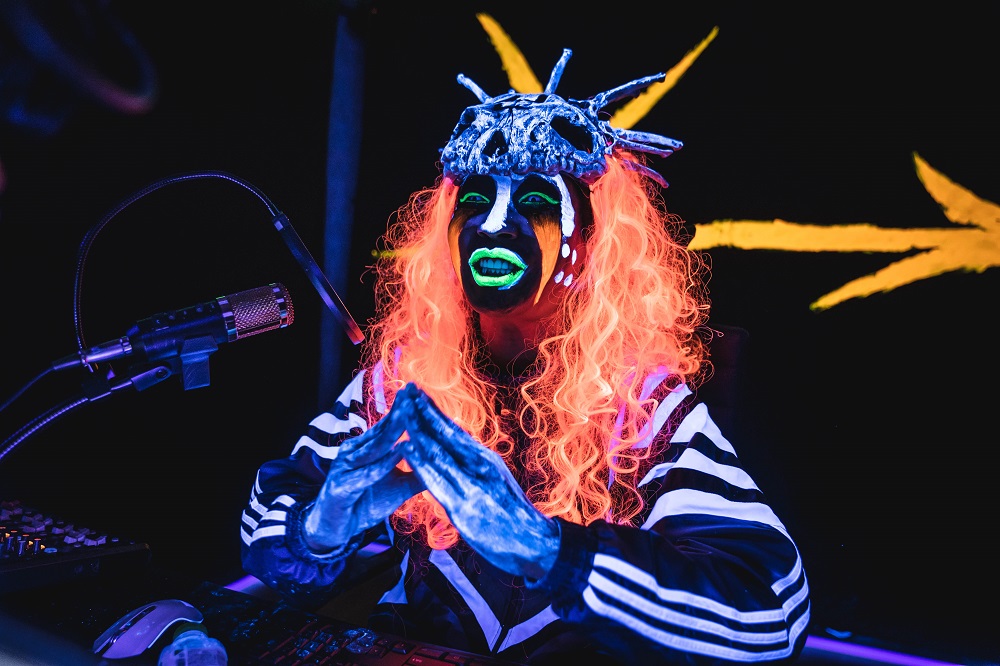
After the incident, criminal police Jin Kyeong-hoon (played by Yang Ik-Joon) defined it as a murder case and launched an investigation.
He found Jeong Jin‑soo who knew the inside story, and asked him questions, but was ridiculed by the other strangely: “I didn’t expect you to investigate God’s deeds.”
Then the plot began to revolve around the New Truth religious where Jeong Jin-soo is located, how it rises (the first three episodes) and how it declines (the latter three episodes).
Although “Hellbound” has only six short episodes, the director divides it into two chapters.
The first three episodes are like the relationship between “Train to Busan” and “Train to Busan 22”.
The protagonist has changed, the social background has changed, and the connotation expressed is also different, which is also the key to the controversy of the whole drama.
Nevertheless, Jeong Jin-soo, played by Yoo Ah‑in, still adds a lot to the drama.
This is a rather complicated and divided character.
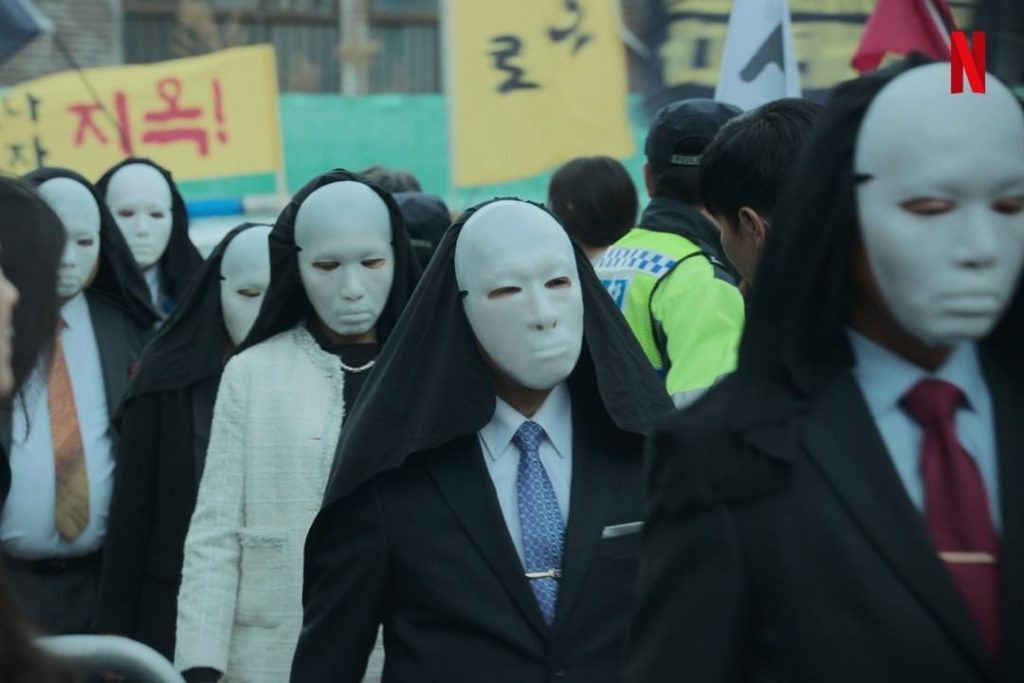
On the one hand, he is the leader of a cult. He spreads fear in the name of “God’s Will”, declaring that those who are declared are guilty.
On the other hand, he tried to use fear to regulate people’s behavior, so that human beings can live more upright, thus welcoming a whole new world.
The director used a lot of details to hint at contradictions in him.
In the character poster of Jeong Jin‑soo, the upper part shows him surrounded by smiling children, like a holy father; the lower part shows him lying alone in a pool of blood.
When Jeong Jin-soo was preaching to the world in the play, the director deliberately divided his face on the live broadcast screen into four pieces, implying that the characters are just on the surface and evil behind the back.
“Hellbound” takes Jeong Jin‑soo as the core and connects the characters and stories of the first three episodes.
The so-called “God’s will” in his mouth is obviously just a fabricated lie.
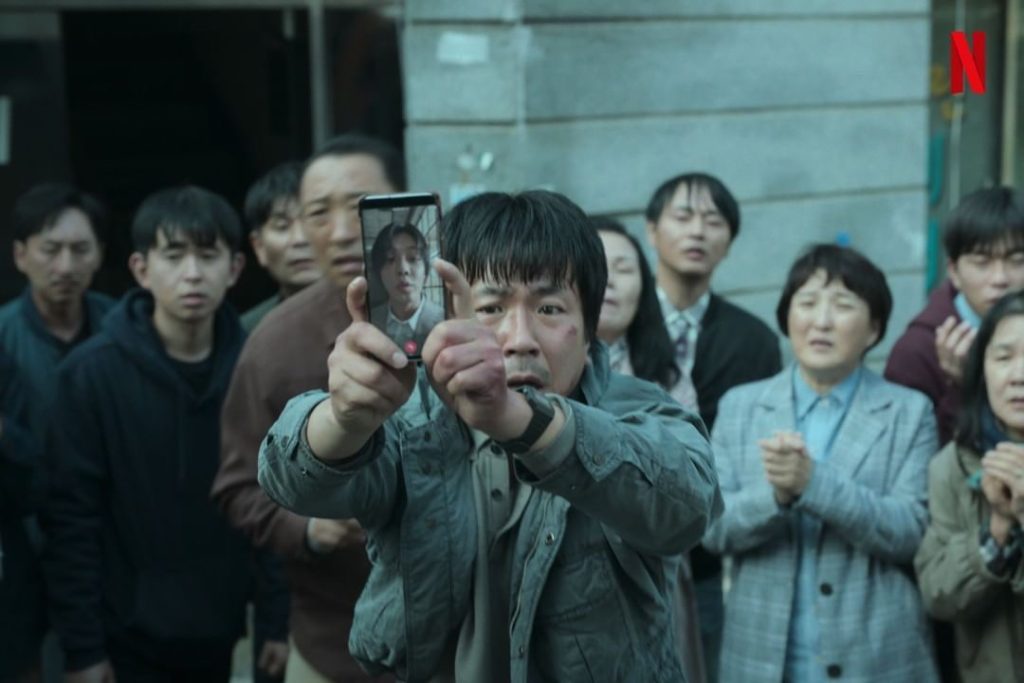
The declaration of death by “God” itself is closer to a random disaster of supernatural phenomena.
Jeong Jin-soo, who was declared dead by the “god” twenty years ago, founded the New Truth religious more to vent his anger towards the world.
If the New Truth religious is the disguise of Jeong Jin-soo’s goodness, then Arrowhead is the manifestation of Jeong Jin-soo’s evil.
Arrowhead, a violent group consisting of blind followers, is not only an eagle dog of the New Truth religious, but also an accomplice in bringing the entire society into disorder.
In short, the existence of Arrowhead is equivalent to the “military force” of New Truth religious.
In the third episode, Jeong Jin-soo went offline directly after being “punished by God” and passed the position of Speaker of New Truth religious to a priest.
The pastor had an anger with Jeong Jin‑soo, and was more brutal than him.
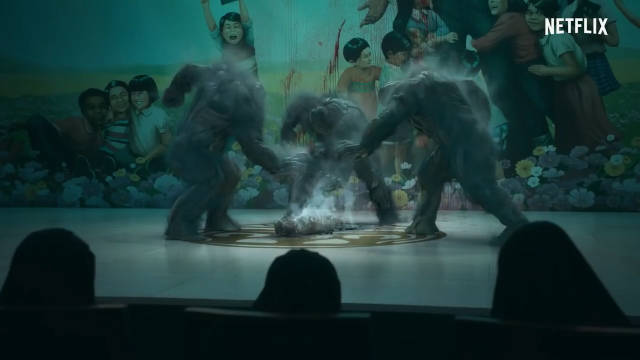
Under the rule of the pastor, the New Truth religious began to penetrate into all aspects of society, to “standardize” people’s words and deeds, and “enlighten” people’s thinking.
From the fourth episode, “Hellbound” officially unveiled its dystopian background-a cult country ruled by New Truth religious and Arrowhead.
New Truth religious is all-pervasive, and their eyeliners are ambush everywhere.
People who disobey a little bit will lead to a violent beating from Arrowhead.
Moreover, the New Truth religious also encourages fights to report against each other, exposes the evils of all human nature to the sun, and broadcasts the brutal and inhumane hell torture process on television.
Under the brutality, everyone is in danger, and people’s beliefs and values are distorted by New Truth religious. They report to each other and tell each other, even the closest and closest people.
Many plot settings in the play have a sense of vision born out of reality.
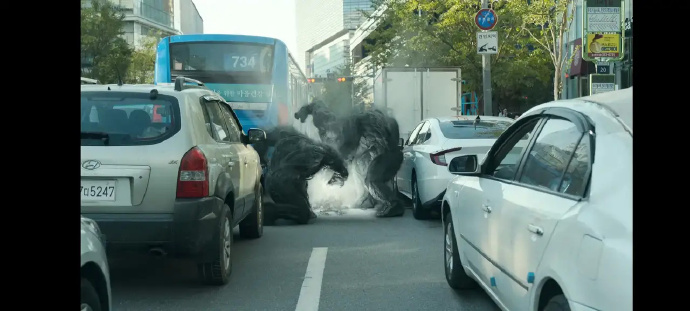
After the declared person “dies,” his family will be labeled as “family of the sinner” and will be inferior to others and be scorned by others.
In life, many renovators and the families of prisoners also live in such dire straits.
At the same time, plots that endow disasters with moral connotations are not uncommon in reality.
After the 9/11 incident, a pastor publicly declared that abortionists must take part of the responsibility for the incident. When we killed 40 million innocent babies, we angered God.
In addition, heretics, aborters, feminists, homosexuals, the American Civil Liberties Union… all contributed to this disaster.
“Hellbound” is not so much a fantasy drama as it is a political thriller.
Many plots in the play have strong political allusions.
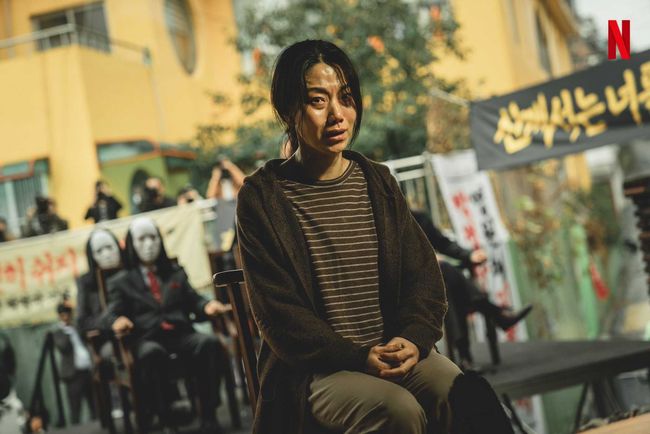
The “Hellbound” dystopian society creates an atmosphere of terror that is exactly the same as the centralized state in “1984” and “Brave New World”.
However, due to space limitations, the plot of “Hellbound” focuses on the ups and downs of the New Truth religious, and it is obvious that the digging of the theme cannot be deep.
Except for Jeong Jin-soo’s point of view, which has a certain speculative meaning, the other characters are many and complicated, and most of them are relatively thin.
It is worth mentioning that the original comic did not appear in the “resurrection” part added at the end of the series-a female character who died tragically by “Heaven’s Punishment” suddenly returned at the end.
This easter egg can be regarded as the director left a way for himself.
If the second season of “Hellbound” comes out next, maybe Yoo Ah-in can be brought back by this reason.
Related Post: Sang-ho Yeon: “Train to Busan” is considering filming the third part,the second season of “Hellbound” has not yet been discussed.


